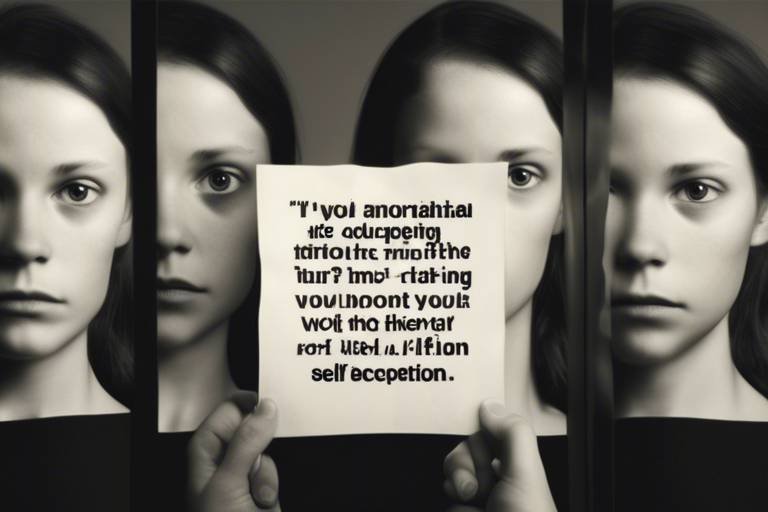The Morality of Self-Deception
Self-deception is a fascinating yet complex aspect of human behavior that raises profound moral questions. At its core, self-deception involves convincing ourselves of something that may not be true, often to shield us from uncomfortable realities. Imagine standing in front of a mirror, seeing a reflection that doesn’t align with who you believe you are. This disconnect can lead to a myriad of emotional responses, from anxiety to relief, depending on how we choose to interpret our own truths. But why do we engage in this behavior? Is it a necessary coping mechanism, or does it represent a moral failing?
As we delve deeper into the morality of self-deception, we must first recognize that it exists on a spectrum. On one end, a little self-deception can be harmless or even beneficial, like telling ourselves we’re capable of achieving a challenging goal. This can boost our confidence and motivate us to push through tough times. However, on the other end, persistent self-deception can lead to significant negative consequences, not just for ourselves but also for those around us. Think of a person who refuses to acknowledge their addiction; their self-deception not only harms them but also strains relationships with loved ones. This duality makes self-deception a moral conundrum.
One of the most intriguing aspects of self-deception is its relationship with honesty. When we deceive ourselves, we often create a façade that shields us from the truth. But at what cost? The tension between self-deception and honesty raises essential questions about personal integrity. Consider the idea that honesty is not just about being truthful to others but also about being truthful to ourselves. When we live in a state of self-deception, we may lose touch with our authentic selves, leading to a life that feels disingenuous. In this way, self-deception can erode our moral compass, blurring the lines between right and wrong.
Moreover, the consequences of self-deception can be profound. While it might offer temporary relief from discomfort, the long-term effects often include damaged relationships and hindered self-awareness. For instance, a person who continually rationalizes their poor choices may find themselves isolated, as friends and family grow weary of their excuses. This cycle of deception can create a feedback loop, where the individual becomes increasingly entrenched in their false narratives, making it even harder to confront reality. The challenge lies in recognizing when self-deception has crossed the line from a protective mechanism to a harmful habit.
In conclusion, the morality of self-deception is a nuanced topic that invites us to reflect on our own lives. It challenges us to consider whether our self-deceptions serve a greater purpose or if they simply lead us down a path of denial. The key takeaway is that while a little self-deception might help us navigate life's challenges, we must remain vigilant about its potential to distort our reality and compromise our moral integrity. After all, the journey toward self-awareness and honesty is not just about facing uncomfortable truths; it's also about fostering healthier relationships with ourselves and those around us.
- What is self-deception? Self-deception is the act of convincing oneself of a falsehood to avoid facing uncomfortable truths.
- Is self-deception always harmful? Not necessarily. While it can have negative consequences, small doses of self-deception can sometimes enhance motivation and resilience.
- How does self-deception relate to cognitive dissonance? Self-deception often arises as a coping strategy to resolve cognitive dissonance, which occurs when we hold contradictory beliefs.
- Can self-deception be justified? This is a complex question, as it depends on the context. In some cases, it may serve a protective function, while in others, it can lead to harmful outcomes.
- How can I overcome self-deception? Recognizing and confronting uncomfortable truths, seeking feedback from trusted friends, and practicing self-reflection can help mitigate self-deception.

Understanding Self-Deception
Self-deception is a fascinating and complex phenomenon that can often feel like a double-edged sword. At its core, self-deception involves convincing oneself of a falsehood to avoid facing uncomfortable truths. It's like wearing a pair of rose-colored glasses that obscure the reality lurking just beyond the lens. We all engage in self-deception at some point in our lives, whether it's telling ourselves that we will start exercising "tomorrow" or believing that a toxic relationship is not as bad as it seems. But what drives us to deceive ourselves?
To fully grasp the intricacies of self-deception, we need to explore its various forms and the psychological mechanisms that enable this behavior. Self-deception can manifest in numerous ways, including:
- Denial: Refusing to accept a painful reality.
- Rationalization: Justifying actions that may be morally questionable.
- Fantasy: Creating an idealized version of oneself or a situation.
Each of these forms serves a purpose, often acting as a protective shield against the harsh realities of life. For instance, someone who has failed at a task may convince themselves that external circumstances were to blame rather than their own shortcomings. This self-deceptive narrative allows them to maintain a sense of self-worth, albeit at the cost of personal growth.
The psychological underpinnings of self-deception are deeply rooted in our cognitive processes. Our brains are wired to create narratives that fit our self-image, often prioritizing comfort over truth. This leads to a fascinating interplay between cognitive dissonance and self-deception, where conflicting beliefs can create mental discomfort. Instead of facing this discomfort head-on, we might engage in self-deception as a coping strategy, essentially rewriting our internal story to align with our desires or fears.
In summary, understanding self-deception requires us to examine not only its definitions and forms but also the psychological mechanisms at play. It's a multifaceted issue that raises important questions about our perceptions of reality, self-identity, and the lengths we go to protect ourselves from uncomfortable truths. As we delve deeper into this topic, we will uncover the moral implications of self-deception and the fine line between beneficial and harmful forms of this behavior.

The Psychological Roots
When we dive into the psychological roots of self-deception, we uncover a fascinating interplay of cognitive processes that shape our understanding of reality. Self-deception isn't just a quirky human trait; it's deeply embedded in the way our minds work. At its core, self-deception is often a response to cognitive dissonance, a psychological phenomenon that occurs when we hold two or more contradictory beliefs or values. Imagine trying to ride a bicycle with a flat tire—it's uncomfortable, and it just doesn't work. Similarly, cognitive dissonance creates a mental discomfort that can be quite overwhelming. To alleviate this discomfort, our minds often craft narratives that allow us to justify our beliefs and actions, even if they are based on falsehoods.
One of the primary mechanisms at play here is the use of defense mechanisms. These are unconscious strategies our minds employ to protect us from anxiety and emotional pain. For instance, when faced with the harsh reality of a failed relationship, a person might convince themselves that the breakup was for the best, even if deep down they know they contributed to the downfall. This kind of self-deception acts as a protective shield, allowing individuals to maintain their self-esteem while navigating the tumultuous waters of emotional distress.
Additionally, the role of rationalization cannot be overlooked. Rationalization is a common form of self-deception where we justify our actions or beliefs to make them more palatable. It's like putting a shiny coat of paint on a rusty old car; it may look good on the surface, but underneath, the issues remain. For example, someone who indulges in unhealthy eating habits might tell themselves that they deserve a treat after a long day, masking the underlying health concerns. This rationalization enables individuals to maintain a positive self-image, even while engaging in behavior that may be detrimental in the long run.
In summary, the psychological roots of self-deception are complex and multifaceted. They intertwine cognitive dissonance, defense mechanisms, and rationalization, creating a web of justifications that allow us to navigate the uncomfortable truths of our lives. Understanding these mechanisms is crucial for anyone looking to improve their self-awareness and foster personal growth. After all, acknowledging our tendencies toward self-deception is the first step in breaking free from its grasp.

Cognitive Dissonance Explained
Cognitive dissonance is a psychological phenomenon that occurs when an individual experiences mental discomfort due to holding two or more contradictory beliefs, values, or attitudes. Imagine standing at a crossroads, with one path leading to a comfortable lie and the other to a challenging truth. This internal conflict can be incredibly unsettling, pushing us to seek a resolution. To alleviate this discomfort, many people unconsciously engage in self-deception, convincing themselves of a false narrative that aligns with their desires or existing beliefs.
To better understand cognitive dissonance, consider the following example: suppose you pride yourself on being environmentally conscious, yet you drive a gas-guzzling vehicle. The clash between your self-image and your actions creates cognitive dissonance, leading to feelings of guilt or shame. To cope, you might downplay the impact of your vehicle on the environment or convince yourself that you will switch to a hybrid car soon. This rationalization serves as a protective shield, allowing you to maintain your self-esteem while avoiding the uncomfortable truth of your current behavior.
The mind employs various strategies to reduce cognitive dissonance, including:
- Changing beliefs: You might alter your beliefs to align with your actions, convincing yourself that your vehicle is not as harmful as it seems.
- Justifying behaviors: You could rationalize your choices by highlighting the benefits of your vehicle, such as safety or comfort.
- Disregarding conflicting information: Ignoring evidence that contradicts your beliefs can help maintain a sense of harmony.
This process of self-deception can be likened to putting on blinders; it allows you to navigate life without confronting the harsh realities that might otherwise disrupt your peace of mind. However, while this coping mechanism can provide temporary relief, it often leads to a cycle of denial that can hinder personal growth and self-awareness.
Ultimately, understanding cognitive dissonance is crucial for recognizing the ways we might deceive ourselves. By acknowledging these patterns, we can begin to confront uncomfortable truths and strive for a more authentic existence. The journey toward honesty may be challenging, but it can lead to greater self-acceptance and healthier relationships with ourselves and others.

Defense Mechanisms in Play
When we talk about defense mechanisms, we're diving into the fascinating world of how our minds work to protect us from emotional turmoil. Think of these mechanisms as the psychological armor we wear to shield ourselves from the harsh realities of life. Self-deception, in particular, is a powerful form of defense mechanism that allows us to navigate through uncomfortable truths without feeling overwhelmed. It’s like putting on a pair of rose-colored glasses; they might distort reality, but they help us feel better about what we see.
One of the key aspects of self-deception as a defense mechanism is its ability to create a buffer against anxiety. When faced with situations that threaten our self-esteem or worldview, our minds often resort to self-deception to maintain a sense of stability. This can manifest in various ways, such as denying responsibility for our actions or minimizing the significance of a problem. For instance, someone might convince themselves that their unhealthy habits aren’t really that bad, allowing them to continue without facing the potential consequences. In this sense, self-deception acts as a comforting lie, a temporary refuge from the storm of reality.
Moreover, self-deception can also serve as a means of preserving relationships. Imagine a friend who consistently makes poor choices but insists they’re doing just fine. By deceiving themselves into believing everything is okay, they can avoid confronting the awkwardness of admitting their struggles. This can lead to a cycle where both the individual and their loved ones are trapped in a web of falsehoods, ultimately complicating the dynamics of their relationships. In the end, while self-deception may provide short-term relief, it can also sow the seeds of long-term discord.
To better understand how self-deception plays out as a defense mechanism, let's take a look at some common forms it may take:
- Denial: Refusing to accept reality or fact.
- Minimization: Downplaying the significance of an issue.
- Projection: Attributing one’s own unacceptable thoughts or feelings to others.
- Rationalization: Justifying behaviors or feelings to make them seem acceptable.
Each of these mechanisms illustrates how self-deception can provide a temporary escape from discomfort. However, it’s essential to recognize that while these mechanisms may offer short-term relief, they can lead to significant long-term consequences. When we allow self-deception to dictate our perceptions, we risk losing touch with reality, which can ultimately hinder our personal growth and emotional well-being.
In conclusion, the interplay of self-deception and defense mechanisms is a complex dance that many of us engage in throughout our lives. While it’s perfectly human to want to shield ourselves from pain, understanding the implications of self-deception can help us make more informed choices. By acknowledging our tendencies to deceive ourselves, we can work towards greater self-awareness and healthier coping strategies that promote honesty and authenticity in our lives.
1. What is self-deception?
Self-deception is the act of convincing oneself of a falsehood to avoid confronting uncomfortable truths. It often serves as a defense mechanism to protect against anxiety and emotional pain.
2. How does self-deception function as a defense mechanism?
Self-deception functions as a defense mechanism by allowing individuals to maintain a positive self-image and cope with conflicting beliefs, often leading to denial or rationalization of their actions.
3. Can self-deception have positive effects?
Yes, in some cases, self-deception can enhance motivation and resilience, helping individuals to push through challenges by maintaining an optimistic outlook.
4. What are the consequences of persistent self-deception?
Persistent self-deception can lead to damaged relationships, hindered self-awareness, and an inability to address important issues in one’s life, ultimately impacting personal growth.

The Role of Rationalization
Rationalization is a fascinating psychological phenomenon that acts as a double-edged sword in our lives. It’s like wearing a pair of rose-colored glasses that help us see the world in a more favorable light, even if that view is distorted. When we engage in rationalization, we create justifications for our actions, often allowing ourselves to feel better about decisions that may not align with our ethical standards or beliefs. Imagine telling yourself that skipping the gym today is okay because you’ll work out twice as hard tomorrow. This is a classic example of how we manipulate our thoughts to avoid facing uncomfortable truths.
The process of rationalization can manifest in various ways, often depending on the situation at hand. For instance, an individual might justify cheating on a test by claiming that everyone else is doing it, or a person might defend their excessive spending by arguing that they deserve a treat after a long week. In both cases, the underlying reality—cheating is dishonest, and overspending can lead to financial trouble—is obscured by a veil of self-constructed justifications.
But why do we engage in this behavior? The answer lies in our innate desire to maintain a positive self-image. When we rationalize, we protect our self-esteem from the blow of guilt or shame. It’s as if we’re building a fortress around our ego, shielding it from the harsh realities of our actions. This can be particularly evident in scenarios where our choices conflict with our values. For example, a smoker might rationalize their habit by saying, “It helps me relax,” despite knowing the health risks involved.
While rationalization can provide temporary relief and emotional comfort, it can also lead to a slippery slope. Over time, the more we justify our actions, the more detached we become from reality. This detachment can create a cycle of self-deception, where we lose sight of our true intentions and values. It’s crucial to recognize when rationalization is at play, as it can prevent us from taking responsibility for our actions and hinder our personal growth.
In the grand scheme of things, rationalization serves as a coping mechanism. It’s a way for our minds to reconcile conflicting beliefs and emotions, but it’s important to strike a balance. Acknowledging the role of rationalization in our lives can help us identify when we’re veering off course. By doing so, we can cultivate a more authentic existence, grounded in honesty and integrity. After all, embracing our flaws and mistakes is a vital part of the human experience. Instead of rationalizing our choices, we should strive to understand them, learn from them, and ultimately grow.

Positive Aspects of Self-Deception
While self-deception often gets a bad rap, it’s essential to recognize that it can serve some positive purposes in our lives. Think of self-deception as a double-edged sword; while it can cut us down, it can also help us rise. For instance, when faced with overwhelming challenges, a little self-deception can boost our motivation and resilience. Imagine an athlete who believes they can win against all odds; this belief, even if slightly inflated, can propel them to train harder and push beyond their limits.
Furthermore, self-deception can act as a protective shield against the harsh realities of life. When we encounter situations that threaten our self-esteem or mental well-being, a bit of self-deception can help us cope. For example, someone who has faced repeated failures might tell themselves that they are on the verge of success. This belief can instill a sense of hope, encouraging them to keep trying rather than succumbing to despair. In this way, self-deception can foster a growth mindset, allowing individuals to see possibilities where none seem to exist.
In the realm of relationships, self-deception can also play a role in maintaining harmony. Sometimes, we choose to overlook minor flaws in our partners or friends, convincing ourselves that these imperfections are insignificant. This selective perception can help sustain positive relationships by allowing us to focus on the good rather than the bad. However, it’s essential to strike a balance; while a little self-deception can enhance our social interactions, too much can lead to unrealistic expectations and eventual disappointment.
Moreover, self-deception can enhance our creativity and problem-solving abilities. When we convince ourselves that our ideas are viable, we’re more likely to pursue them passionately. This kind of optimistic self-deception can lead to groundbreaking innovations and artistic expressions. Think of inventors or artists who, against all odds, believed in their vision. Their self-deceptive confidence often drove them to create things that changed the world.
In summary, while self-deception is often painted in a negative light, it can also serve as a valuable tool in our psychological toolkit. By understanding its positive aspects, we can learn to harness it wisely, using it to fuel our ambitions, maintain our relationships, and foster creativity. The key lies in recognizing when self-deception is beneficial and when it becomes detrimental, allowing us to navigate the complex landscape of our minds with greater awareness.
- What is self-deception? Self-deception is the act of convincing oneself of a falsehood to avoid uncomfortable truths.
- Can self-deception be beneficial? Yes, self-deception can enhance motivation, resilience, and creativity, as well as help maintain relationships.
- How does self-deception relate to cognitive dissonance? Self-deception can serve as a coping mechanism to alleviate the discomfort caused by holding contradictory beliefs.
- What are the dangers of self-deception? Persistent self-deception can lead to damaged relationships and hindered self-awareness.

The Moral Implications
The concept of self-deception is a double-edged sword, wielding both potential benefits and significant moral dilemmas. At its core, self-deception involves a conscious or unconscious decision to ignore or distort the truth to shield oneself from uncomfortable realities. But this raises an important question: Can self-deception ever be justified? The answer isn’t straightforward and often depends on the context in which it occurs. For instance, one might argue that self-deception can serve as a coping mechanism during traumatic events, allowing individuals to navigate through their pain. However, this very act can lead to a slippery slope where the line between helpful and harmful becomes blurred.
When we consider the ethical ramifications of self-deception, we must also reflect on the implications for personal integrity and relationships. Self-deception can erode trust—not just in ourselves, but also in the connections we have with others. When we lie to ourselves, we often project that falsehood onto our interactions, leading to a web of deceit that can damage our relationships. For example, if someone convinces themselves that they are in a happy relationship despite clear signs of dissatisfaction, they may continue to mislead their partner, ultimately causing more harm than good.
Moreover, self-deception can create a false sense of security. Imagine a person who believes they are in excellent health despite ignoring symptoms of a serious condition. This kind of self-deception not only jeopardizes their well-being but also places a burden on healthcare systems and loved ones who may be unaware of the individual's true state. The moral implications here are significant: by choosing to deceive oneself, one may inadvertently endanger others.
To further illustrate the moral complexities of self-deception, consider the following scenarios:
- Scenario 1: A student convinces themselves that they don't need to study for an upcoming exam. This self-deception may lead to poor performance, but it also reflects a deeper issue of procrastination and avoidance.
- Scenario 2: An employee believes they are indispensable to their company, ignoring feedback that suggests otherwise. This can lead to stagnation in their career and resentment among colleagues.
In both cases, the individuals are engaging in self-deception that not only affects their personal growth but also has wider implications for their environment. Thus, while some may argue that self-deception can foster resilience, it is crucial to weigh these benefits against the potential for harm.
Ultimately, the moral implications of self-deception compel us to confront a fundamental truth: the value of honesty, both with ourselves and others. Embracing honesty may be uncomfortable, but it paves the way for genuine growth and deeper connections. As the saying goes, “The truth will set you free,” and in the context of self-deception, this couldn’t be more accurate. By choosing to face the truth, we not only enhance our self-awareness but also cultivate healthier relationships built on trust and authenticity.
1. What is self-deception?
Self-deception is the act of convincing oneself of a falsehood or ignoring uncomfortable truths to avoid facing reality.
2. Can self-deception be beneficial?
Yes, in some cases, self-deception can enhance motivation and resilience, helping individuals cope with difficult situations.
3. What are the moral implications of self-deception?
Self-deception raises ethical questions about honesty, integrity, and the potential harm it can cause to oneself and others.
4. How does self-deception affect relationships?
It can erode trust and lead to misunderstandings, as individuals may project their false beliefs onto their interactions with others.

Self-Deception vs. Honesty
When we think about the battle between self-deception and honesty, it’s like watching a thrilling tug-of-war unfold. On one side, we have the comforting embrace of self-deception, which can sometimes feel like a warm blanket on a cold night. It shields us from harsh realities and allows us to maintain a facade of positivity. But on the other side, there’s honesty, a bright light that can illuminate the darkest corners of our minds, revealing truths we might not be ready to face. The question is: which one should we choose?
Self-deception often comes as a friend during tough times. Imagine you’ve just faced a setback at work, and instead of acknowledging your mistakes, you convince yourself that the situation was unfair or that you were simply a victim of circumstances. This kind of thinking can provide temporary relief, allowing you to avoid feelings of inadequacy or failure. However, while this self-deception may offer short-term comfort, it can lead to a slippery slope where the line between reality and falsehood becomes increasingly blurred.
On the flip side, honesty demands courage. It requires us to confront uncomfortable truths about ourselves and our lives. Honesty can be brutal, but it also fosters growth. When we embrace honesty, we open the door to self-awareness and personal development. For instance, acknowledging our flaws can lead to meaningful changes in behavior, ultimately improving our relationships and overall well-being. But let’s be real—who wants to face the music when it’s so much easier to dance around it?
To illustrate this struggle, consider the following comparison:
| Aspect | Self-Deception | Honesty |
|---|---|---|
| Emotional Impact | Temporary relief, avoidance of discomfort | Initial pain, long-term growth |
| Impact on Relationships | Can create distance, hinder authenticity | Builds trust, fosters deeper connections |
| Personal Growth | Stagnation, avoidance of change | Encourages self-reflection and improvement |
As we navigate life’s complexities, we often find ourselves at a crossroads, weighing the benefits of self-deception against the virtues of honesty. It’s a personal choice, and there’s no one-size-fits-all answer. Some may argue that a little self-deception is necessary for maintaining a positive outlook, while others may contend that honesty is the only way to truly thrive. Ultimately, the key lies in finding a balance. Acknowledging when self-deception serves as a protective mechanism and when it hinders growth is crucial for living an authentic life.
So, how do we strike this balance? It begins with self-awareness. Taking a moment to reflect on our thoughts and feelings can help us identify when we’re slipping into self-deceptive patterns. Ask yourself: Is this belief serving me, or is it holding me back? By cultivating honesty with ourselves, we can navigate the murky waters of self-deception while still allowing room for compassion and understanding.
In conclusion, the dance between self-deception and honesty is intricate and often fraught with tension. While self-deception can provide temporary solace, honesty paves the way for genuine growth and deeper connections. Understanding this dynamic equips us to make more informed choices about how we perceive ourselves and our experiences. In the end, the journey toward honesty may be challenging, but it’s a path worth taking.
- What is self-deception? Self-deception is the act of convincing oneself of a falsehood to avoid uncomfortable truths.
- Why do people engage in self-deception? People often engage in self-deception as a coping mechanism to protect themselves from emotional pain or cognitive dissonance.
- Is self-deception ever beneficial? Yes, in some cases, self-deception can enhance motivation and resilience, helping individuals cope with challenges.
- How can I recognize self-deception in my life? Reflect on your thoughts and beliefs; if they seem to shield you from reality, you may be engaging in self-deception.
- How does honesty contribute to personal growth? Honesty fosters self-awareness and allows for meaningful changes, ultimately improving relationships and well-being.

Consequences of Self-Deception
Self-deception can often feel like a cozy blanket, wrapping us in a false sense of security. However, beneath that comforting layer lies a host of potential consequences that can ripple through various aspects of our lives. When we choose to deceive ourselves, we are not just lying to our minds; we are also jeopardizing our relationships, personal growth, and overall well-being. The implications can be profound, often leading to a cycle of denial that can be difficult to escape.
One of the most significant consequences of self-deception is the impact it has on our relationships. When we refuse to acknowledge the truth about ourselves or our actions, we create a barrier between us and those we care about. Trust is the foundation of any meaningful relationship, and self-deception can erode that trust faster than a summer storm. For instance, if someone consistently rationalizes their negative behavior—like being overly critical of a partner—they may find that their partner feels increasingly alienated. The more we deceive ourselves, the more we risk pushing others away, leading to isolation and loneliness.
Moreover, self-deception can stunt our personal growth. When we refuse to confront our flaws or the reality of our situations, we miss out on valuable opportunities for self-improvement. Imagine trying to fix a car without acknowledging that it has a flat tire. It's simply not possible! Similarly, if we don't recognize our shortcomings, we can't work towards overcoming them. This stagnation can lead to feelings of frustration and dissatisfaction, creating a vicious cycle that can be hard to break.
Additionally, self-deception can have far-reaching effects on our mental health. By denying uncomfortable truths, we may inadvertently increase our anxiety and stress levels. It's like trying to hold a beach ball underwater; the more we struggle to keep it down, the more it wants to pop back up. This internal conflict can manifest in various ways, such as depression, anxiety disorders, and even physical health issues. The longer we engage in self-deception, the more we risk developing a distorted view of reality, which can lead to a sense of hopelessness.
Furthermore, the repercussions of self-deception can extend to our professional lives. When we convince ourselves that we are performing well at work despite evidence to the contrary, we may miss out on promotions or opportunities for advancement. Employers value honesty and accountability, and if we are unable to accurately assess our performance, we risk stagnating in our careers. This can lead to resentment and dissatisfaction, not only with our jobs but with ourselves.
In summary, while self-deception might offer temporary relief from uncomfortable truths, its long-term consequences can be detrimental. From damaged relationships and hindered personal growth to increased anxiety and professional stagnation, the costs can be steep. Recognizing and addressing self-deception is crucial for fostering a healthier, more honest life. It's essential to remember that facing the truth, no matter how uncomfortable, is often the first step toward genuine growth and fulfillment.
- What is self-deception? Self-deception is the act of convincing oneself of a falsehood to avoid facing uncomfortable truths.
- How does self-deception affect relationships? It can erode trust and create barriers, leading to feelings of isolation and alienation.
- Can self-deception have positive effects? In some cases, it can enhance motivation and resilience, but it often comes with significant risks.
- What are the signs of self-deception? Common signs include rationalizing poor behavior, avoiding difficult conversations, and experiencing persistent anxiety.
Frequently Asked Questions
- What is self-deception?
Self-deception is the act of convincing oneself of a falsehood to avoid facing uncomfortable truths. It often involves creating a narrative that allows individuals to maintain a certain belief or perception, even when it contradicts reality.
- How does cognitive dissonance relate to self-deception?
Cognitive dissonance occurs when a person holds contradictory beliefs, leading to mental discomfort. Self-deception acts as a coping mechanism, allowing individuals to resolve this discomfort by justifying their beliefs or actions, thereby preserving their self-esteem.
- Can self-deception have positive effects?
Yes, self-deception can lead to positive outcomes in certain situations. For instance, it might enhance motivation, boost resilience, or help individuals cope with challenging circumstances by providing a more favorable outlook on their lives.
- What are the moral implications of self-deception?
The moral implications of self-deception are complex. While it can sometimes be justified as a means of self-protection, persistent self-deception can lead to ethical dilemmas, damaging relationships and hindering personal growth.
- How does rationalization play a role in self-deception?
Rationalization is a form of self-deception where individuals justify their actions to maintain a positive self-image. This process allows people to engage in questionable behavior without feeling guilt or shame, as they create acceptable explanations for their choices.
- What are the consequences of living in a self-deceptive state?
Living in a state of self-deception can lead to various negative consequences, including damaged relationships, hindered self-awareness, and an inability to confront personal issues. Over time, this can result in a cycle of denial that prevents growth and healing.
- Is honesty always better than self-deception?
While honesty is generally viewed as a virtue, the relationship between honesty and self-deception is nuanced. In some cases, a small degree of self-deception might serve as a protective mechanism, but ultimately, embracing honesty fosters deeper connections and personal integrity.


















